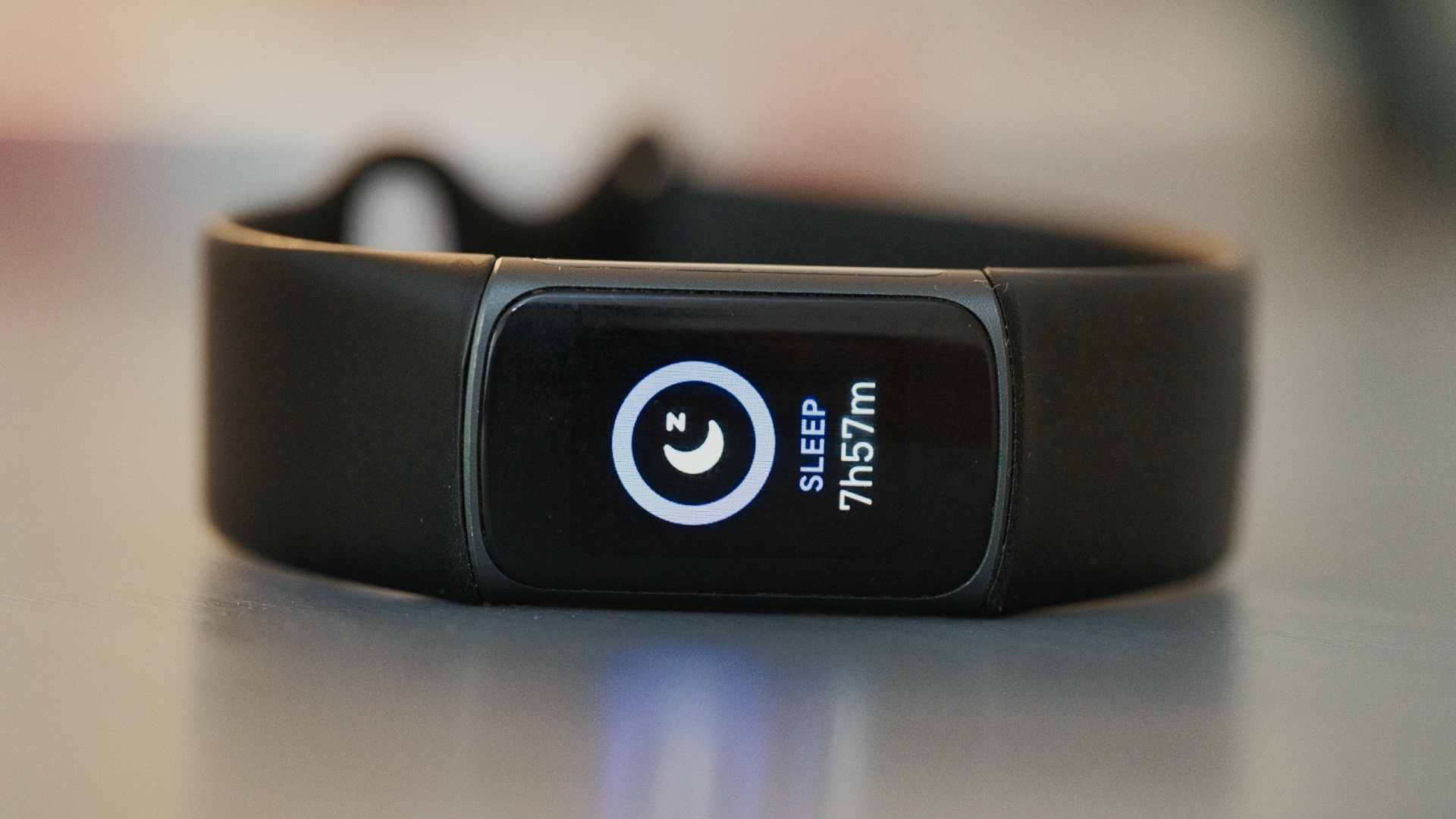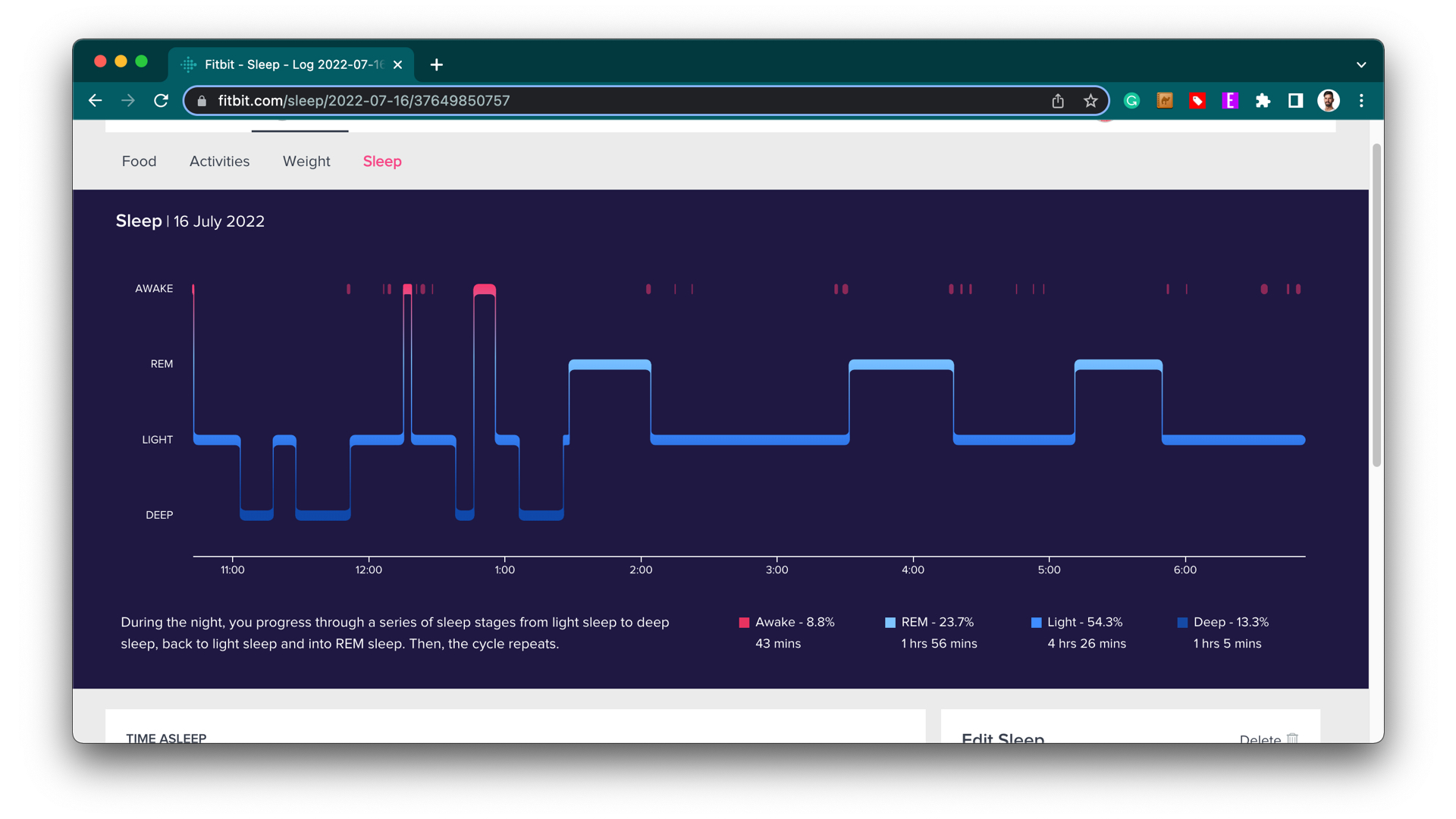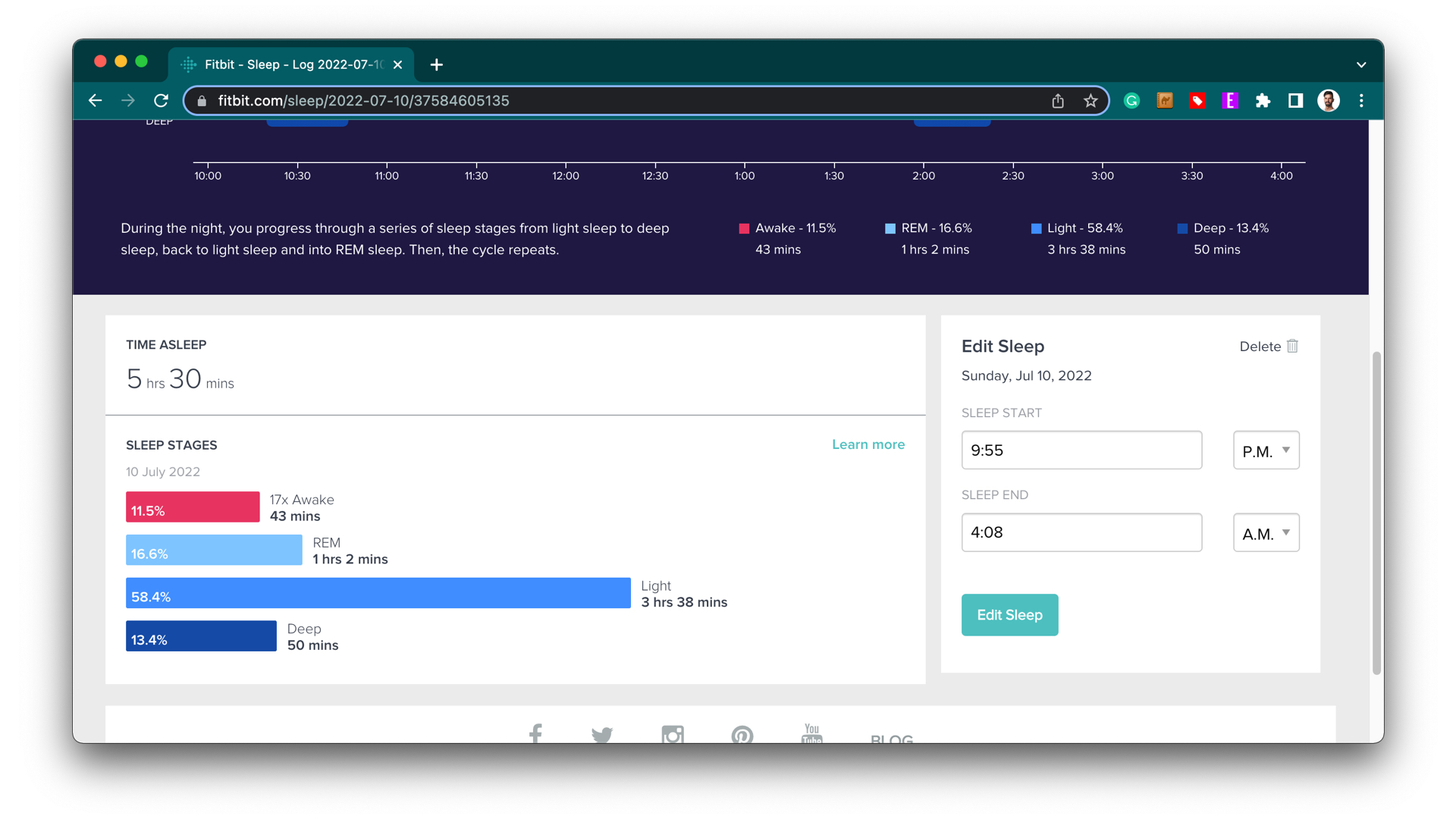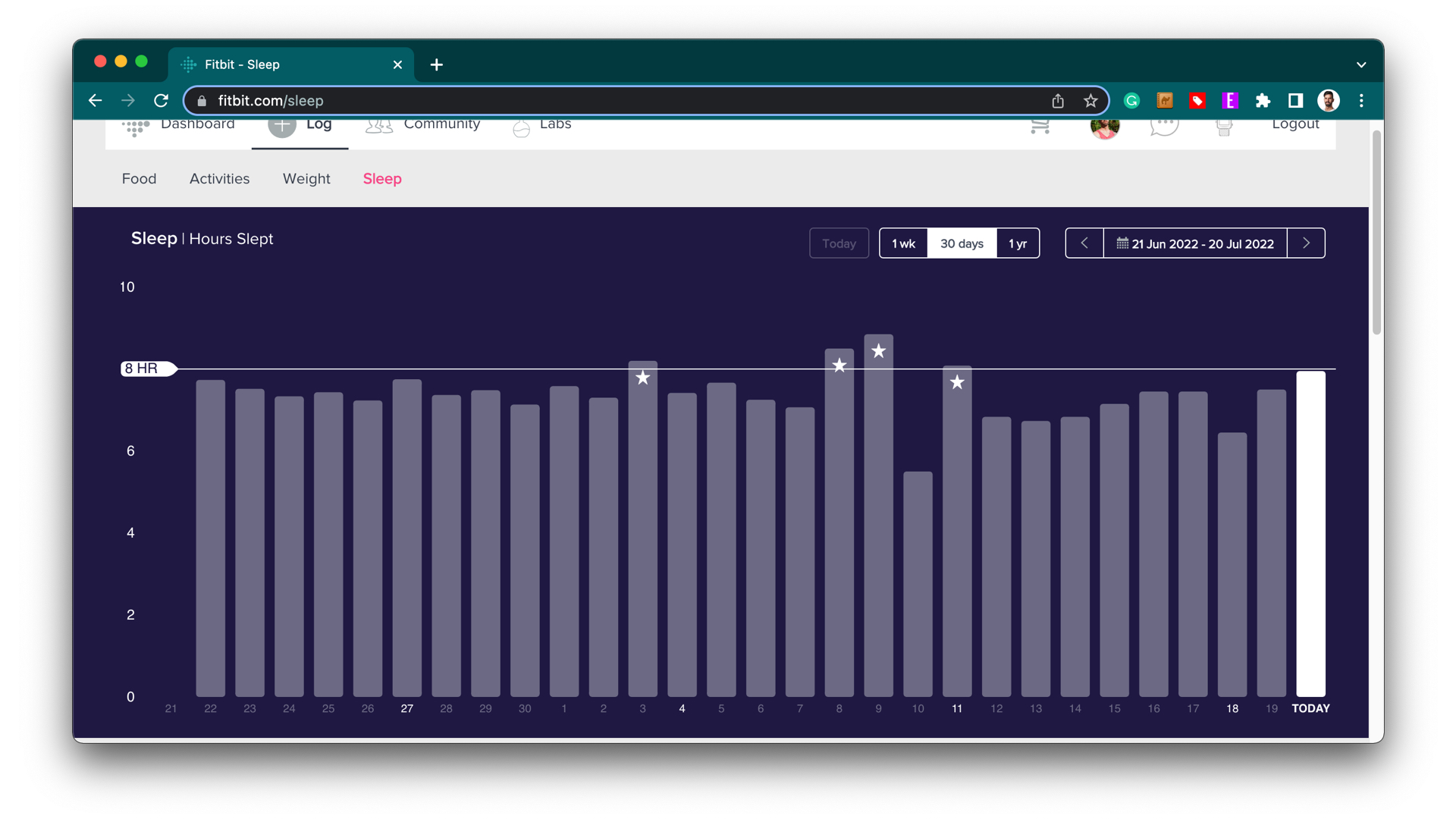I tracked my sleep with a Fitbit Charge 5 for a month and here is what I learned
I wore my Fitbit for sleeping for some of the hottest nights of the year – here are 3 things that I learned from the experience


Get all the latest news, reviews, deals and buying guides on gorgeous tech, home and active products from the T3 experts
You are now subscribed
Your newsletter sign-up was successful
I have a steady sleep schedule, don't drink too much alcohol and avoid caffeine after midday; yet, my sleep is far from being perfect. I often find myself tossing and turning in bed at night just to wake up groggy. Well, maybe not groggy but definitely less than energised. So when Fitbit asked if I wanted to participate in a month-long 'sleep study', I jumped on the opportunity, hoping I could gain deeper insights into my sleeping habits.
In return for participating in the experiment, Fitbit very kindly sent over a Fitbit Charge 5 for me to use, which is probably the best Fitbit tracker right now to track sleep, thanks to its small form factor and the fact it has the latest sensors and features (e.g. Readiness Score, ECG). Larger Fitbits such as the Fitbit Versa 3 might not be as comfortable to wear for sleeping, although I'm sure people would also get used to that.
There was another reason why I wanted to start tracking my sleep with Fitbit: the brand just recently announced a new feature called Sleep Profile that provides a Monthly Sleep Analysis based on ten key sleep metrics. Most importantly, I wanted to find out what my Fitbit Sleep Animal was; that's the best bit! Sadly, I have to wait until the first day of August to actually find out what Sleep animal I am, but at least I collected enough data already for the app to be able to work things out.
[UPDATE 1 AUG 2022: Despite me being adamant that my Sleep Animal would be the Parrot, it actually ended up being the Bear. Who would've thought?]
Fitbits are generally good for sleep tracking; no wonder the Fitbit Charge 5 tops our best sleep tracker roundup. Even without Fitbit Premium, you can access loads of useful data about your sleep that might help you sleep better. Or it might not, but even so, it's interesting to see how you slept and what Sleep Score your Fitbit gave you. Of course, having a Fitbit Premium subscription makes this data even richer and the insights deeper.
Tracking sleep for a month with Fitbit – How it went
To ensure my Fitbit Charge 5 provides the Fitbit App with the most accurate data possible, I wore the tracker day and night almost continuously. I took it off for an hour or so every day to give my skin a chance to breathe, but apart from that, the tracker was around my wrist for the whole duration of the experiment.
This meant that the Charge 5 tracked my heart rate and activities all day long, not just my slumber. It's important because the more your wearable knows about your activities, the better it can estimate strain and recovery (the Charge 5 does it via the Readiness Score).
Get all the latest news, reviews, deals and buying guides on gorgeous tech, home and active products from the T3 experts
That said, I only used the Fitbit Charge 5 as a passive activity tracker during my runs, walks and cycles as I didn't want to drain its battery too much by turning the GPS on (it's not too accurate anyway). Fitbit's are great for automatic activity tracking, so even though I didn't tell the Charge 5 I was running, it logged the activity as a run nevertheless, albeit without distance data.
Without further ado, here are three things I learned from tracking my sleep with the Fitbit Charge 5.

Lesson #1: I do most of my deep sleep early on the night
I was quite surprised that my sleep follows the same rhythm almost every night: I'm quick to fall asleep, get most of my deep sleep not long after and spend more and more time 'half-awake' as wake-up time draws nearer.
The fact that I don't get a lot of deep sleep after midnight-2 am is probably the reason why I feel like I haven't slept well; since I toss and turn closer to my wake-up time, the memory of that is fresher than the deep sleep that happened before.
According to the Fitbit App, my shortest sleep was 5 hours and 30 minutes (had to wake up at 4 to go to London to run the ASICS London 10K [links to the race's website]), and my longest was 8 hours and 51 minutes (sorry, not sorry, I was on holiday). On both days, my sleep followed a similar schedule, with most of my deep sleep happening before 2 am.
Why? I have no idea, but it seems like my circadian rhythm works this way. It's worth mentioning that I have mild scoliosis, and my back starts hurting more the more I lay down; this might affect my sleep.

Lesson #2: I spend less time awake than I thought
For some reason, I often wake up before I turn in bed. Maybe I wake up because my fiancee turns, but nevertheless, I often find myself dragging the pillows over to the other side of the bed with me, feeling like that's all I do during the night instead of sleeping.
As it turns out, I don't spend a disproportionately long time awake when I sleep. In fact, it's well within the normal range, as I found out. Sure, I wake up briefly when I turn, but I fall back asleep almost instantly, so these brief moments don't compromise my overall sleep quality (not too much, anyway).
Naturally, I spent more time awake when it was hot; it's harder to fall back asleep when you're hot and bothered in bed. There is a Guided 'Get More Sleep' Programme in the Fitbit App, should you want to improve your sleep; this offers guided sleep goals, bedtime routine suggestions and relaxation tools to help you improve sleep.
Weirdly enough, even just knowing that I didn't sleep terribly helped me feel more energised during the day. Before I started tracking my sleep properly, I sometimes felt lethargic, thinking I spent all my time awake during the night, but once I realised I didn't, I could consciously convince myself I was actually fine. This goes to show how me being tired was some kind of psychosomatic effect.

Lesson #3: I can sleep less sometimes without compromising overall sleep quality
As mentioned above, even though I have a relatively steady sleep schedule, some days I sleep longer than others. Surprisingly, my average weekly Fitbit Sleep Score didn't change for four weeks, at least not too much: it was between 84-87 points.
This taught me an important lesson: an odd day when you don't sleep long enough isn't going to ruin your energy levels as long as you stick to a steady sleep schedule on most days. No need to mope over not getting 9+ hours of sleep and feeling lethargic all day; your body should be able to cope with the occasional lousy sleep day.
Should you wear a fitness tracker for sleep?
I found wearing the Fitbit Charge 5 to bed an immensely useful experience. It helped me understand how I can improve my sleep and, most importantly, why I don't need to worry about certain sleep habits.
Knowing is half the battle, as G.I. Joe used to say, and understanding my sleep better was beneficial in not feeling tired during the day, even though I didn't change my sleeping habits significantly.
Will I continue to wear the Charge 5 for bed? I most certainly will, at least until I find out what Sleep Animal I am or until my free Premium trial runs out, which is a cool five months away. And, who knows, I might extend my Premium membership once the trial is over...

Matt Kollat is a journalist and content creator for T3.com and T3 Magazine, where he works as Active Editor. His areas of expertise include wearables, drones, action cameras, fitness equipment, nutrition and outdoor gear. He joined T3 in 2019.
His work has also appeared on TechRadar and Fit&Well, and he has collaborated with creators such as Garage Gym Reviews. Matt has served as a judge for multiple industry awards, including the ESSNAwards. When he isn’t running, cycling or testing new kit, he’s usually roaming the countryside with a camera or experimenting with new audio and video gear.